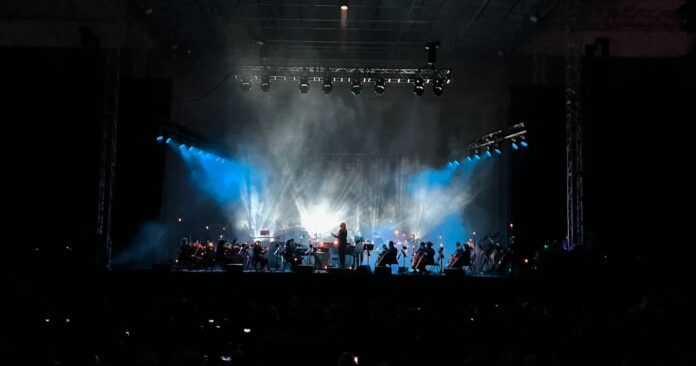I would love to experience what audiences experienced in 1999, when the Icelandic band Sigur Rós put out their breakthrough album Ágætis byrjun. Singer Jónsi was not shy about his ambition to change all of music, and if critics were right, he succeeded. “To term this music ‘post-rock’ would be an insult; Sigur Rós are pre-whatever comes this century,” rhapsodized Pitchfork.
And yet today, while its epic scope and unrelenting pursuit of heart-stirring beauty remains impressive, it sounds just south of twee—a mostly major-key vision of magical things happening, with even its occasional descents into the minor-key morass quickly resolving into their usual uplift. Sigur Rós must be sick to death of comparisons to the Icelandic landscape, but their music suggests vistas seen from a distance—snow-capped mountains, dancing auroras—rather than rugged volcanism and elemental terror. Today, among Iceland’s pop ambassadors, they seem less kin to the visions of Björk or Múm than precursor to the communal folk-pop of Of Monsters and Men.
Seeing Sigur Rós perform at the Greek Theater in Berkeley with the Wordless Music Orchestra Sun/27, I was reminded of nothing so much as the Candlelight Concerts that have taken over local venues by stealth in the last few years. Fake votives are lit, while the local branch of the Listeso String Quartet cranks out classical versions of Taylor Swift or Queen songs, smearing a paper-thin patina of prestige on the hits you recognize. Sigur Rós isn’t in the nostalgia business, though the audience clapped with appropriate politeness as tracks “Starálfur” and “Hoppípolla” swelled up. But the artificial candles were there in spades, a chamber’s-worth of musicians sawed dutifully away at their string instruments, and there was a sense of “isn’t this nice” that had little to do with the group’s reputation for exotic, revolutionary alienness.
The most obvious presence wasn’t lead eccentric Jónsi but conductor Robert Ames, who stood at the fore of the stage and gesticulated grandly as the frontman wailed and horse-haired his guitar with a violin bow slightly behind him. The visual emphasis on Ames over Jónsi suggested we were supposed to think of this as a classical performance, with all the brain-food connotations and implications of politesse that come with it. Certainly what Sigur Rós is doing now much more resembles Western classical music than what they were doing in 1999; after drummer Orri Páll Dýrason stepped down in 2018 following an accusation of sexual assault from a fan, the band elected not to replace him.
This could have been an opportunity to explore the textural, ambient, and emotional depths of their music. Their new album Atta, alas, sounds more than anything else like the music that might play at the end of a Tom Hanks movie when he’s reunited with his wife and children.
It’s pop-classical in other words: light music, game music, soundtrack music, with really only Jónsi’s still-astonishing falsetto and the presence of a few electric guitars to distinguish it. Each song faded out after a few minutes—the length of a rock song rather than a movement in a symphony. This kind of sweeping majesty certainly works for some people (“excitement, joy, happiness and tears,” reads one audience review on the band’s website) but doesn’t seem meaningfully different from any other light-classical music intended to evoke a sense of uplift and wonder, especially now that Sigur Rós have completely shaken off their rock-music trappings and essentially become an ambient big band.
The music sounded immersive and womb-like thanks to the sound and structure of the Greek Theater, a classic tiered amphitheater with great sound save the occasional unpleasant treble shriek from a violin. Yet I was not gripped by peals of joy or sadness, simply comfortable as I was treated to a pleasant sound bath.
One tangible positive that came out of Sigur Rós treating their set like a symphony gig is an unusually well-behaved audience. Crowds have notably gotten more rude and obnoxious after COVID, but there were no errant whistles or bro-voiced exhortations of “I love you.” Someone actually shushed me at one point when I was calling some friends to find them, and I was thankful that they did. The band was even able to let moments of silence into their songs without the audience members racing each other to be the first to clap.
It seems fitting that they should have a crowd so nice, given that “nice” is the adjective I would most readily apply to their performance—but nothing more superlative, I’m afraid.






